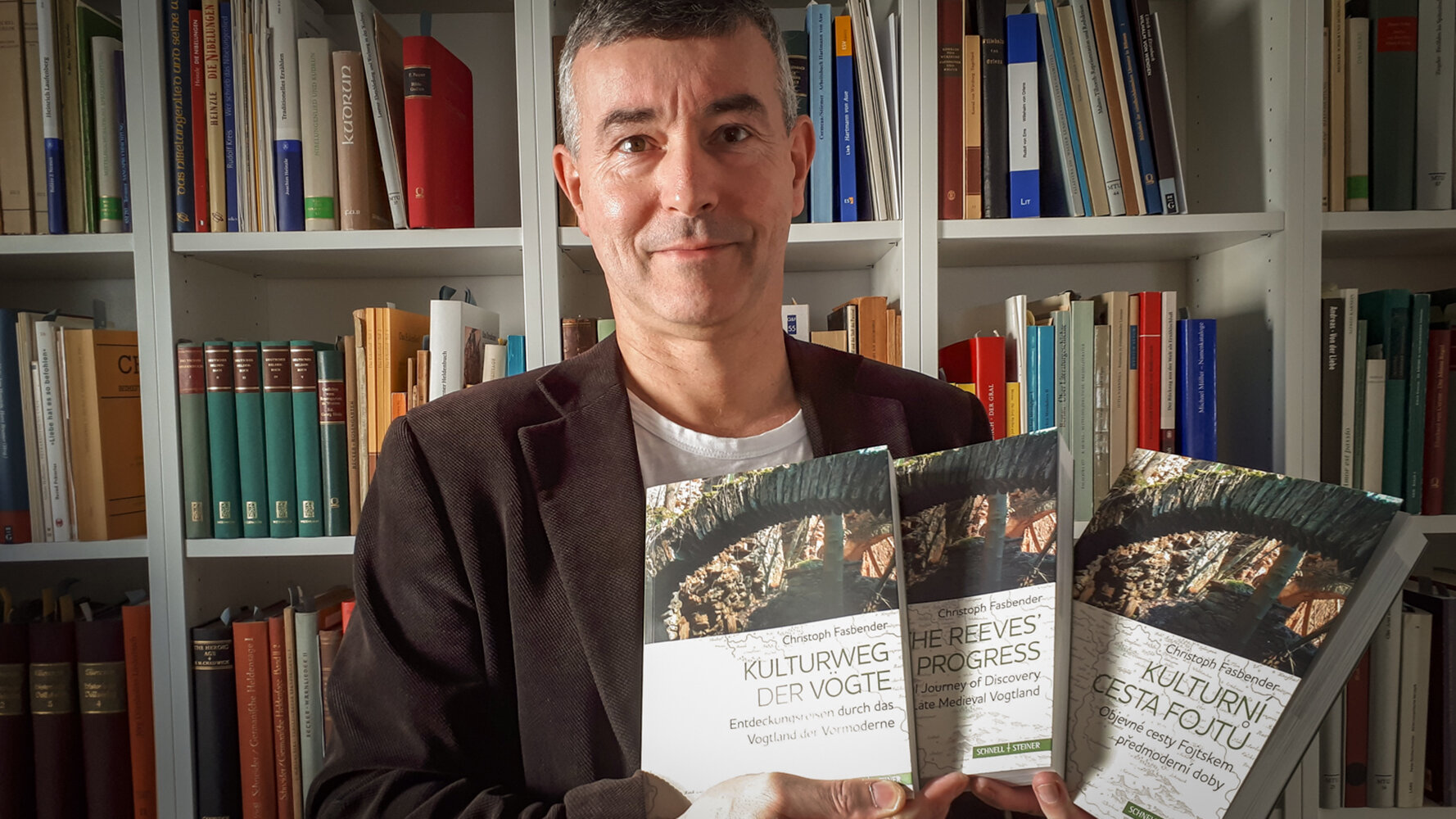"Kulturweg der Vögte" (“The Reeves’ Progress”) – An Invitation to Discovery
Professorship of History of German Literature and Language at Chemnitz University of Technology whets appetite for journey to Vogtland region of pre-modern times - Multilingual cultural guide links tourist attractions, explains historical backgrounds
-

Prof. Dr. Christoph Fasbender presents the cultural guide Kulturweg der Vögte: Entdeckungsreisen durch das Vogtland der Vormoderne (The Reeves’ Progress: A Cultural Journey of Discovery through Late Medieval Vogtland) which is now available in German, English, and Czech editions. Photo: private
The major cultural-historical-touristic project The Reeves’ Progress, which created a new link between Germany and the Czech Republic, has been completed. From 2016 to 2020, the project, which was funded with 1.7 million euros from the European Regional Development Fund (ERDF), advanced the field of cultural tourism with the participation of the Professorship of History of German Literature and Language (German). This project aimed to help the dominion of the former reeves of Weida, Gera and Plauen’s cultural legacy to gain new visibility. Prof. Dr. Christoph Fasbender, holder of the professorship, is nevertheless not entirely happy, because The Reeves’ Progress was supposed to attract more curious visitors to the Saxon, Czech, Thuringian, and Franconian Vogtland as early as spring 2020, but the Corona pandemic has thrown a wrench in the works at many of the 150 networked sights at some 80 stations in Thuringia, Bavaria, Saxony, and the Czech Republic. "Of course, we don't yet know what's coming in 2021," Fasbender says. That's the advantage of this project, according to Fasbender. The Vogtland is a thousand-year-old cultural landscape and "won't run away from us."
"Market analyses in the run-up to the project showed that, until 2016, the Vogtland was primarily advertised as a region for bikers and hikers. The many old castles, palaces, manors, churches, or monasteries that stand around in the forests and on the mountains were mostly left out of the picture and remained voiceless," assessed the Chemnitz scientist. As far as the presentation of cultural monuments is concerned, there is a lack of stable and sustainable infrastructure beyond the city of Plauen. "It was therefore the main goal of the Chemnitz sub-project to reliably compile the available knowledge about the pre-modern Vogtland, to put it into perspective, and to tell history to those interested - the history inscribed in the buildings, but also the stories that have attached themselves to the places," Fasbender explains.
The cultural guide The Reeves’ Progress: A Cultural Journey of Discovery through Late Medieval Vogtland is now available in three editions – German, English, and Czech - as a major result of the research project. "The project’s funding made it possible for the 450 richly illustrated pages to be available for pocket change," says the Chemnitz professor. The book is intended to attract the curious to the Vogtland region, but it should also have an impact on the cultural region’s self-image. "Data and figures about this region are available on the Internet. Good stories that we’re still thinking about on the way home, not so much." The Reeves’ Cultural Trail’s tourist potential is great, he says, because along the route, the music of the past, medieval food and drink, and historical weaponry can be brought together and to tourists. "This also includes the great potential of novellas, sagas, and novels on this subject - for example, for readings and plays in a historical setting," says the scientist.
Fasbender is particularly concerned about the Saxon-Czech dimension of the cultural-historical-touristic project: "The Czech Vogtland, or rather the part of the Czech Republic that once belonged to the land of the reeves, has largely lost this part of its history due to the social changes of the past centuries. That is why I am particularly pleased that the cultural guide is also available in Czech. For many citizens in our neighboring country, this will be their first contact with this part of their past." The school play, which his colleague Luca Kirchberger wrote as part of the project and developed with elementary schools in the Vogtland region, has also been available in print in Czech translation for a few days. "The medieval horror story about the young girl who rescues her father, who has fallen out of favor with the king, from captivity by fearlessly facing all kinds of dangers - it certainly works with Czech schoolgirls, too," says Fasbender.
"We can't leave things the way they were. The books want to be presented and studied, the plays want to be performed, the plaques want to be placed on many buildings along the cultural trail, and the multilingual flyers that we have written want to be read. And I would also be pleased if the results of our scientific conference “Das Vogtland, die Vögte und die Literatur des Mittelalter” (“The Vogtland, the Reeves, and the Literature of the Middle Ages”), which took place in Cheb in April 2018, would also receive attention in specialist circles," Fasbender concludes.
Bibliographic Information for the English Edition: Fasbender, Christoph: The Reeves’ Progress: A Cultural Journey of Discovery through Late Medieval Vogtland. Regensburg: Verlag Schnell & Steiner. 448 pages, ISBN 978-3-7954-3541-7, Price: 20 euros.
Multimedia: The Tourismusverband Vogtland e.V., one of the eleven project partners, invites you to a "Voyage of Discovery on the Reeves’ Cultural Trail" in a film (German). Professor Fasbender can also be seen and heard in the video.
Contact: Prof. Dr. Christoph Fasbender, Phone +49 371 531-37866, E-mail christoph.fasbender@phil.tu-chemnitz.de
(Author: Mario Steinebach/Translation: Chelsea Burris)
Matthias Fejes
03.02.2021




